
25th October - 23rd November




25th October - 23rd November


The 2024 edition of Film Africa showcased 70 films from more than 20 African countries and the diaspora. The festival took place over 10 days, transforming London into a hub of African cinema, with screenings taking place at some of the city’s most prestigious venues, including the BFI, Rich Mix, Ciné Lumière, Barbican Centre and Bertha DocHouse.
The festival kicked off with opening film Dahomey at the BFI attended notably by Maya Jaggi (Financial Times), Sharon Hemans (BBC World Service Africa Podcast), and reviewers Latoya Austin (Franglais27 Tales), Matthew Morlai Kamara (Movies1) and Film blogger, Kelechi Ehenulo. The packed screening was followed by a reception in the BFI Balcony Bar which the above press attended.
BBC World Service producer Richard Hamilton interviewed Director Mohamed Challouf about his documentary Ouga: Capital of Cinema, a tribute to Ouagadougou, home of the Fespaco Film Festival together with Film London Curator, Keith Shiri for the BBC World Service. This ran on the BBC World Service Breakfast Show, Newsday and international current affairs programme, NewsHour.
CNN covered the opening night and closing night films, filming a television package for their flagship international programme Africa Avant Guard. They interviewed Keith Shiri, Abderrahmane Sissako (director of Black Tea) and a young filmmaker from the British Council Film Lab for a 10-minute segment dedicated to Film Africa in the 30-minute programme (March 2025) Reuters filmed a television package on the festival featuring interviews with Keith Shiri and Albert Donkor - producer of Nyame Mma. This was syndicated worldwide, including across Africa.
Press were particularly interested in talking to Keith Shiri about the evolution of African cinema and where the industry is today. Keith shared his knowledge in an op-ed piece for The Big Issue and appeared on BBC Radio London Robert Elms show. Sara Chitambo, director of Black People Don't Get Depressed was interviewed by presenter Aminata Kamara on her Friday evening magazine show on BBC London. Film Africa was featured in the Sight & Sound weekly film bulletin which goes to the BFI mailing list.
The festival closed with a screening of Black Tea by Abderrahmane Sissako - followed by a Q&A with Abderrahmane Sissako and lead actress Nina Mélo. In attendance was Li-lian Ahlskog Hou (CNN), Natasha Mulenga (Reuters), Tim Allen (Times Radio), Nico Lurot (SilverScreenDudes), Sonia Mendeh (BBC London), Joanna Wade (BBC Producer) and Charlotte Metcalf (Country and Townhouse).


CNN International show Africa Avant Garde - flagship international magazine programme. One 10-minute segment will be about Film Africa in a film festival special. To be released in March 2025, this 30 minute segment will feature interviews with Keith Shiri, Abderrahmane Sissako (director of Black Tea) and Sandra Adaora Anyanwu - a young filmmaker from the British Council Film Lab.
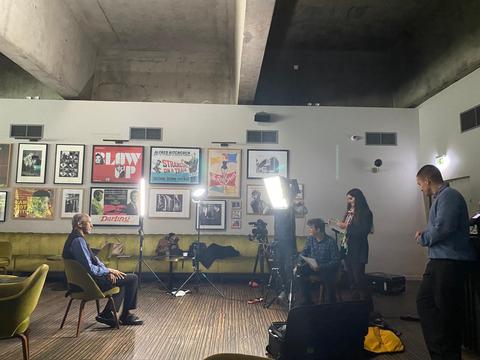

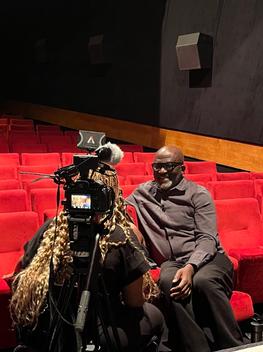


Keith Shiri, festival curator, and Albert "Trebla" Donkor, producer of Nyame Mma, were featured in a compelling Reuters package highlighting key films from the festival, including Nyame Mma, Black People Don’t Get Depressed, and Dahomey. Designed for broad distribution, the segment will be shared with Reuters subscribing broadcasters across Africa and beyond, offering outlets flexible editing options to tailor the material to their audiences.





BBC World Service producer Richard Hamilton interviewed Director Mohamed Challouf about his documentary Ouga: Capital of Cinema, a tribute to Ouagadougou, home of the Fespaco Film Festival together with Film London Curator
Keith Shiri for the BBC World Service
29.10.24

Keith Shiri, Curator of the Festival, was interviewed by Robert Elms for his show on BBC Radio London, where he discussed the programme of the festival in detail, highlighting the diverse selection of films and the themes explored. - 18.10.24 (Reach: 548k listeners)

Sara Chitamabo, Director of Black People Don’t Get Depressed, was interviewed by Aminata Kamara celebrating black culture and the stories of the diaspora for BBC Radio London01.11.24 (Reach: 548k listeners)




Curating a line-up of over 70 films for an event like Film Africa (25 Oct–3 Nov) is both an exciting and daunting task. I wanted to capture the rich diversity of African cinema spanning more than 20 countries: from Morocco to Madagascar, Sierra Leone to Senegal – while showcasing the exceptional storytelling that defines African cinema today and has the potential to touch people from all over the world.
As a curator with many years’ experience, every decision I make is deliberate, especially when it comes to how cinema interacts with memory, both personally and collectively Each film in this programme is a gem Every choice has meaning and purpose behind it Nearly 300 films were submitted for Film Africa this year alone I watched all of them, often moving between multiple screens before eventually distilling the list to a final 70 films, including shorts I’m addicted to watching films, and it’s been incredible to discover the creativity and the diversity of stories coming from the continent.
When it comes to curating a film festival, People often ask, “What’s the theme?” But it’s hard to know at first. I just watch the films and ideas emerge. I remember trying to figure out how to approach the theme for Film Africa this year. I had just been to Berlin, where I watched Dahomey – our opening film by Senegalese filmmaker Mati Diop and winner of the Golden Bear at the 2024 Berlinale. The documentary presents a dramatised account of the return of 26 royal treasures from a museum in France to their rightful home. I also watched several other films by powerful female filmmakers such as Rungano Nyoni’s On Becoming a Guinea Fowl, a dark comedy-drama which begins to address the hidden sexual abuse and buried secrets of a traditional, middle-class Zambian family
Their work really stood out to me That’s when I realised that women were dominating the programme with their powerful storytelling and I wanted to celebrate that. I’m not exaggerating when I say that this is a golden moment for African women in cinema.
As I continued watching the films, I began to think more broadly. That’s when the idea came to me to develop a theme inspired by Dahomey – the idea of restitution. It is not just physical artefacts that are stolen; this year’s festival explores the restitution of African culture through film, their cinematic heritage. The Ciné Lumière in South Kensington will showcase films restored by the World Cinema Project, a non-profit founded by Martin Scorsese in 1995 to preserve seminal films – and therefore culture – from around the world This includes 1968’s groundbreaking Mandabi, the first-ever feature film shot in an African language (Wolof) directed by ‘the father of African film’ Ousmane Sembène

Yet ordinary people, particularly in Africa, don’t have access to these films. Very few people in Senegal, where Sembène was born and lived, would have seen Mandabi, a spectacular and beautiful film. A symposium at the same venue will shine a light on current efforts to restore and repatriate Africa’s rich film legacy, delving into the broader questions of ownership, preservation, and the ethical dimensions of cultural restitution. For me, restitution means restoring these films and taking them back to the continent where they belong. It’s about creating a space where these works can be enjoyed by the people for whom they were made
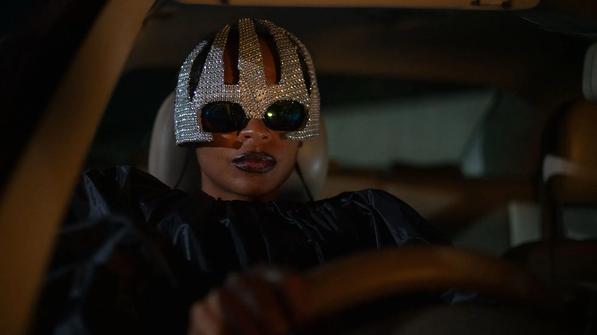
The films in this programme seek to offer audiences something completely different from the stereotypical stories often told about Africa Instead, it’s about discovering and giving voice to the unheard stories of African people When we look at the films emerging from Africa, they remind us that cinema is not just about entertainment; it is a medium for preserving memories, sharing experiences, and reflecting on history
African cinema started much later than the global film industry, with pioneers like Sembène emerging in the 1960s At that time, African filmmakers faced immense challenges, particularly with the use of celluloid film Developing films required access to laboratories, and since there were very few in Africa, filmmakers had to rely on European or North American facilities to produce their work. That dependency limited their creative freedom. But the shift from celluloid to digital has empowered African creators, allowing them to become independent storytellers. Today, all you need is a camera and access to storage, and you can make a film. This has led to a surge in African filmmakers, who no longer depend on foreign resources or perspectives. Young filmmakers are creating their own visual narratives, whether it’s through traditional cinema or new platforms like TikTok.
Nevertheless, filmmakers in Africa continue to face significant challenges due to the lack of state support and infrastructure In most African countries, there is no equivalent to the BFI, making it difficult for filmmakers to thrive and limiting their ability to produce and distribute films effectively This lack of support is a crucial issue, and it’s something that needs to change across the continent
What is also important in overcoming these challenges is strengthening a commitment to nurturing emerging filmmakers by establishing mentorship and training programmes. I’m really proud that Film Africa is hosting Film Lab Africa at Rich Mix, where a panel showcasing emerging young talent from Lagos, Nigeria, co-hosted by the British Council, will provide young filmmakers with essential skills, industry knowledge, and networking opportunities.
We need to rethink and have deeper conversations about the global world we live in Africa is often absent from these discussions People talk about Africa, but not to Africa Despite this, I am optimistic about the future of African cinema Cinema is like a dream, you can’t control it, you can’t predict or direct it, and it will never stop evolving I believe this year’s programme is testament to that creative spirit




FILM AFRICA: In our conversation with Lead Curator Keith Shiri, we explore how this year's selection highlights evolving African cinema, amplifying voices while addressing funding and distribution challenges. Film Africa 2024 is set to make its return from 25 October to 3 November, perfectly timed with Black History Month. Hosted by the Royal African Society, this year’s festival promises a line-up of over 70 films from more than 20 countries The opening gala features the acclaimed documentary Dahomey (2024), directed by Senegalese filmmaker Mati Diop
Throughout the festival, screenings will take place in London’s BFI Southbank, Ciné Lumière, and Rich Mix In our conversation with Keith Shiri, Film Africa’s Lead Curator, we explore how this year’s selection embodies the evolving narratives of African cinema, addressing themes of identity, resilience, and innovation. Shiri offers his insight into the curatorial process and the festival’s role in amplifying the voices of African filmmakers on a global stage while tackling the persistent challenges of funding, distribution, and representation.


With over 70 films from various countries featured in the 2024 edition, could you share your selection process?
Curating a lineup of over 70 films for an event like Film Africa is both an exciting and daunting task. Our approach aims to capture the rich diversity of African cinema while showcasing exceptional storytelling that resonates on a global scale.
We begin with an open call for submissions to filmmakers across the continent and the diaspora via Film Freeway. This invites a wide range of entries, allowing us to discover both well-known directors and emerging voices. This year, we received around 300 entries via Film Freeway, but we also sourced another 100 titles to complement the open submissions.
We also take recommendations from international film programmers from other festivals, including Cannes, TIFF, Venice, and FESPACO, film critics, filmmakers, academics, and representatives from cultural institutions. For the shorts programme, we invited students from the National Film and Television School at Beaconsfield to help in the preselection process under the guidance of Sandra Hebron, the Head of Screen Arts at the school.
Our approach aims to capture the rich diversity of African cinema while showcasing exceptional storytelling that resonates on a global scale.
What criteria do you prioritise when curating such a diverse lineup?
We try to stick to the usual process of selecting films as for any festival:
Artistic Quality: We prioritise films that demonstrate high-level skills—direction, cinematography, sound design, and editing play crucial roles in our assessment. Strong artistry enhances the viewer’s experience and contributes significantly to the film’s impact.
Narrative and Themes: The stories told through these films are essential. We seek narratives that reflect unique cultural perspectives, explore contemporary issues, showcase personal experiences, or spark broader conversations about societal dynamics.
Representation and Diversity: Our lineup aims to represent a rich tapestry of African cultures, languages, and identities. We’re conscious of geographic diversity, gender representation, and the inclusion of varied themes, ensuring no voice is overlooked.
Innovation: We encourage innovative storytelling techniques and non-traditional narratives that challenge conventional formats or genres. Emerging filmmakers who bring fresh perspectives are particularly welcome.
Potential for Audience Engagement: Films that provoke thought, evoke strong emotions or foster community dialogue hold special significance. We consider how a film might resonate with both festival audiences and the broader cultural landscape.
Final Selection: After initial reviews and discussions, the Lead curator narrows down the films to create a balanced and cohesive programme. The final lineup reflects a commitment to representation, quality, and the potential for impactful storytelling.




Film Africa 2024, one of Europe’s most celebrated showcases of African cinema, is set to return from 25 October to 3 November. Hosted by the Royal African Society, this year’s edition coincides with Black History Month, offering audiences a range of films from across the African continent and its diaspora. Over 70 films from more than 20 countries will be screened at some of London’s most prestigious venues, including BFI Southbank, Ciné Lumière, Barbican, and Rich Mix.
The festival kicks off on 25 October with the opening gala screening of Dahomey (2024), a documentary by Senegalese filmmaker Mati Diop. The film, winner of the Golden Bear at the 2024 Berlinale, tells the story of the return of 26 royal treasures from France to their rightful home in Benin.
The closing film, Black Tea (2024), directed by Mauritanian filmmaker Abderrahmane Sissako, will have its UK premiere on 3 November at BFI Southbank. The romantic drama follows a young Ivorian woman on a life-changing journey to China, where she finds love.


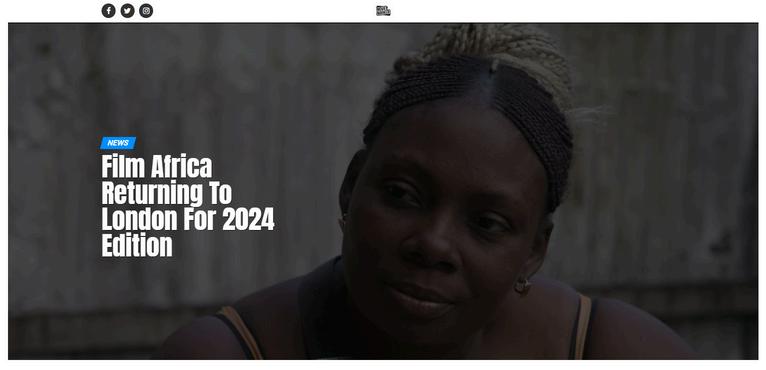

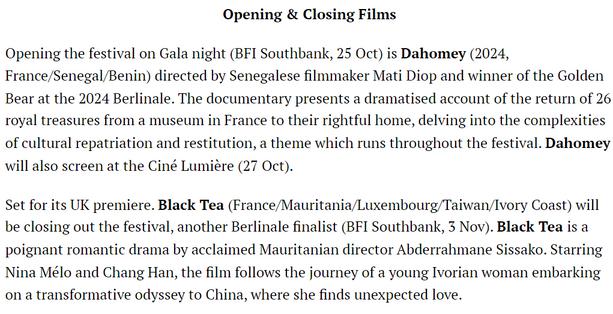


















FilmAfricawasoneofthetopthingstodoinLondonontheWeekendof26-27October 2024.Severalofthefilmsandeventshavebeencoveredacrosstheweek.






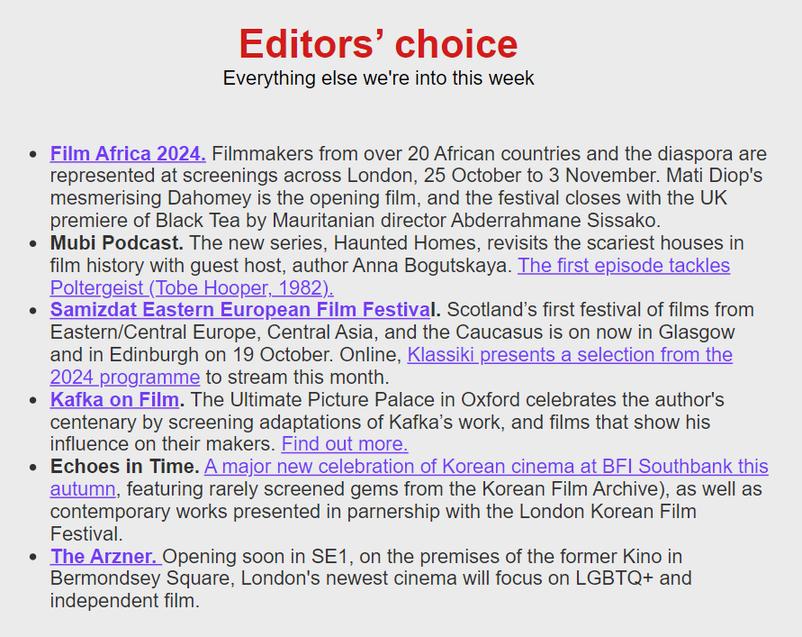



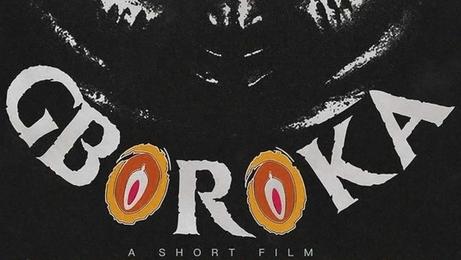






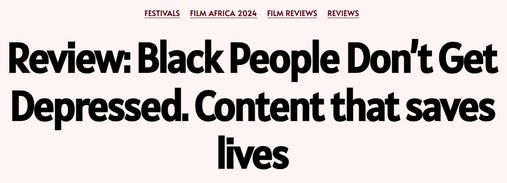






FULL PROGRAMME HERE
[London, 2024] - The Royal African Society is delighted to announce that Film Africa (25 Oct - 3 Nov), one of the most anticipated and celebrated showcases of African cinema in Europe, will return for its 2024 edition during Black History Month
For ten exciting days, Film Africa will transform London into a bustling hub of African cinema, with screenings taking place at some of the city’s most prestigious venues Bringing together visionary filmmakers from over 20 African countries and the diaspora, from Morocco to Madagascar, Sierra Leone to Senegal, Film Africa is an unparalleled showcase of contemporary African cinema, highlighting the diverse narratives and innovative spirit thriving across the continent today.
These include films from new talent (After the Long Rains by 23-year-old Swiss-Kenyan director Damien Hauser) as well as restored classics (Mandabi by Ousmane Sembène “the father of African cinema”), queer cinema (Nyame Mma by Joewackle J Kusi) and over a third of films directed by women.
“African cinema is flourishing and this year’s festival has a line-up of over 70 films, from captivating features that tackle complex social issues, compelling documentaries that uncover untold stories, and innovative shorts from cutting-edge talent Audiences will travel through the rich terrains of African storytelling, witnessing firsthand the creativity and indomitable spirit that defines African cinema today”, said Keith Shiri, Lead Curator of Film Africa 2024
BFI Southbank
Opening the festival on Gala night (25 Oct) is Dahomey (2024, France/Senegal/Benin) directed by Senegalese filmmaker Mati Diop and winner of the Golden Bear at the 2024 Berlinale. The documentary presents a dramatised account of the return of 26 royal treasures from a museum in France to their rightful home, delving into the complexities of cultural repatriation and restitution, a theme which runs throughout the festival Dahomey will also screen at the Ciné Lumière (27 Oct)
Closing the festival for its UK premiere is Black Tea (2024, France/Mauritania/Luxembourg/Taiwan/Ivory Coast), another Berlinale finalist (3 Nov) Black Tea is a poignant romantic drama by acclaimed Mauritanian
director Abderrahmane Sissako Starring Nina Mélo and Chang Han, the film follows the journey of a young Ivorian woman embarking on a transformative odyssey to China, where she finds unexpected love
One of the festival's most anticipated events (Ciné Lumière, 2 Nov) is an unscripted discussion between award-winning filmmaker and artist Abderrahmane Sissako (Black Tea) and filmmaker Sir John Akomfrah (Handsworth Songs), who recently represented Britain at the Venice Biennale The pair will discuss their celebrated careers, having respected and followed each other’s work for decades.
Contemporary African Cinema
For his third feature After the Long Rains (2024, Kenya), 23-year-old Swiss-Kenyan director Damien Hauser was influenced by Studio Ghibli The tender coming-of-age story follows Aisha (Electricer Kache Hamisi), a ten-year-old Kenyan girl who dreams of becoming an actress Determined to buck village tradition, she befriends a fisherman to get a job on a boat so she can sail to Europe (3 Nov)
Screening at the Rich Mix in Bethnal Green is On Becoming a Guinea Fowl (2024, Ireland/United Kingdom/United States/Zambia), directed by BAFTA award-winning Zambian-Welsh director Rungano Nyoni (28 Oct) The dark comedy-drama follows Shula (Susan Chardy), who after finding the body of her uncle begins to address the hidden sexual abuse and buried secrets of her traditional, middle-class Zambian family. The film won the Cannes Un Certain Regard Best Director award (2024) and will also be screened at the Barbican (30 Oct)
Rosine Mbakam, an award-winning Cameroonian filmmaker, joins the line-up with her uplifting feature debut Mambar Pierrette (2023, Belgium/Cameroon). The film follows a talented and resilient seamstress in Cameroon (played by non-professional actor, Pierrette Aboheu Njeuthat) as she struggles to support her children and mother(30Oct) Sara Chitambo’s debut feature BlackPeopleDon’tGetDepressed (2024, South Africa/Nigeria/Canada) addresses the stigmas of mental illness in Black and African communities as the filmmaker faces her depression head-on (3 Nov).
Also screening at the Rich Mix is Disco Afrika: A Malagasy Story (2023, France/Madagascar/Germany/Mauritius/Qatar/South Africa). Kwame (Delanoël Parista Sambo), a sapphire miner, returns to his home village where he reconnects with his community's decades-long fight against corruption. The film is directed by Luck Razanajaona, who provides Madagascar with its first-ever selection for a major international festival featuring at Berlin and Toronto (31 Oct)
Screening at the Garden Cinema (2 Nov) is Nabil Ayouch’s Everybody Loves Touda (2024, Morocco/France/Belgium/Denmark/Netherlands/Norway) The film follows Touda (Nisrin Erradi), a single mother who performs in dingy bars to make ends meet but longs to become a traditional Moroccan singer and dancer (Sheikha) to give her deaf-and-mute son (Joud Chamihy) a better life
The Legend of the Vagabond Queen of Lagos (29 Oct) by Nigerian filmmaking force The Agbajowo Collective (2024, Nigeria/Germany/South Africa/United States) is based on the real-life events between November 2016 and April 2017, where Lagos state authorities forcibly and violently evicted more than 30,000 residents from the OtodoGbame community, an informal fishing settlement on the outskirts of Lagos city. The film follows a young mother (Temiloluwa Ami-Williams) from a waterfront slum who stumbles upon a hoard of corrupt blood
money The filmmaking collective comprises seven directors: James Tayler, Ogungbamila Temitope, Okechukwu Samuel, Mathew Cerf, Edukpo Tina, Bisola Akinmuyiwa and A S Elijah The film will also screen at the Hackney Picturehouse (2 Nov)
Rich Mix
Mother of All Lies (2023, Morocco/Egypt/Qatar/Saudi Arabia) is an Arabic-language documentary directed by Asmae El Moudir (2 Nov). The film, which took eight years to make, explores El Moudir’s search for truth in her family’s background. El Moudir crafts a set of miniature clay figurines to recreate her childhood street in Casablanca, Morocco. Family, friends, and neighbours interact with the miniatures, reflecting upon their past to unravel their collective history, in particular the 1981 Casablanca Bread Riots which resulted in the massacre of many residents. El Moudir won the Un Certain Regard Best Director award at Cannes for the film.
Bertha DocHouse
Home of UK documentary, Bertha DocHouse, is screening Billy Woodberry’s documentary Mário (2024, France), which explores the legacy of Mário Pinto de Andrade, a key figure in African revolutionary and anti-colonial struggles. Spending a life in exile, he fought tirelessly for African sovereignty. Woodberry is one of the leading directors of the L.A. Rebellion film movement, a generation of young African and African-American filmmakers who created a black alternative to Hollywood (2 Nov) Tongo Saa (Rising Up at Night) (2024, Democratic Republic of the Congo/Belgium/Germany/Burkina Faso/Qatar) by Nelson Makengo follows the residents of Kinshasa after plans to build the largest power plant in the Congo plunge 17 million people into darkness and insecurity (2 Nov)
Ciné Lumière
At the Ciné Lumière in South Kensington (26 Oct - 3 Nov) Film Africa will showcase films restored by The World Cinema Project, a non-profit founded by Martin Scorsese in 1995 to preserve seminal films from around the world
These include the groundbreaking Mandabi (1968, France/Senegal), the first-ever feature shot in an African language (Wolof), directed by Ousmane Sembène (28 Oct). Also screening is Chronicle of the Years of Fire (1975, Algeria), directed by Mohammed Lakhdar-Hamina. This historical drama, which won the Palme d'Or at Cannes, portrays the Algerian War of Independence (1954–1962) through the eyes of a peasant (27 Oct)
Another notable screening is Timité Bassori’s The Knife Woman (La Femme Au Couteau) (1969, Ivory Coast), an African classic which follows an Ivorian man (played by Bassori himself) haunted by visions of a mysterious woman with a knife symbolising Africa's struggle to reclaim its cultural heritage (28 Oct)
Complementing the screening programme at Ciné Lumière will be a symposium on African film restoration on 26 October This event will feature practitioners and industry leaders from the world of film restoration and archiving, including Didi Cheeka (researcher and archivist), Pedro Pimenta (producer and archivist), Cecilia Cenciarelli (Cineteca di Bologna), and Aboubakar Sanogo (AFHP/FEPACI), moderated by Dr June Givanni, a pioneering international film archivist and founder of the June Givanni PanAfrican Cinema Archive
“Acknowledging the historical challenges faced by African filmmakers in preserving their cinematic heritage, the symposium aims to shine a light on current efforts to restore and repatriate Africa’s rich film legacy Bringing together experts, industry leaders, and policy-makers, this symposium will not only explore the technical and cultural facets of film restoration but also delve into the broader questions of ownership,
preservation, and the ethical dimensions of cultural restitution This critical conversation will provide invaluable insights into how we can collectively ensure that the artistry of African filmmakers continues to be celebrated and accessible for generations to come ” - said Keith Shiri
South London Gallery
Film Africa’s ‘Dine & View’ shorts programme will be held at the South London Gallery in Peckham (26 Oct - 2 Nov) Films will be accompanied by African cuisine and explore themes from gender, sexuality and love, to climate change, migration and African politics Among the lineup is Gboroka (2024, Sierra Leone) by Hickmatu Bintu Leigh, a thought-provoking insight into the rich tapestry of the Bondo culture, an all-female secret society in West Africa, and its relationship to female genital mutilation (FGM)
Black Corporeal (Breathing by Numbers) (2022) is a powerful art film by acclaimed artist and South London poet Julianknxx, highlighting the disproportionate impact of air pollution in inner-city London. The film is anchored by the voice of grassroots campaigner Rosamund Adoo-Kissi-Debrah CBE, whose 9-year-old daughter Ella was the first person in the world to have air pollution listed as a cause of death
The programme also showcases short films about queer Ghanaian lives, exploring familial, platonic and romantic relationships amid increased tensions incited by anti-LGBTQ+ politics in Ghana Nyame Mma or ‘Children of God’ (2024) follows Kwamena (Kobina Amissah-Sam) a young man who returns home after his father’s sudden death The film offers a nuanced perspective on how isolating grief can be for queer, African men Director Joewackle J Kusi was in the process of finishing the film when an anti-LGBTQ+ bill was passed in Ghana, putting cast and crew at risk The award-winning film Reluctantly Queer (2016) was directed by Akosua Adoma Owusu and follows a young Ghanaian man (Kwame Edwin Otu) who struggles to reconcile love for his mother with his sexuality. Dzifa (2022) is an intimate drama directed by Savannah Acquah, which follows a queer couple as they navigate the nuances of their relationship The film explores the multifaceted experiences of young black queer people living in the UK, rewriting depictions of a solely homophobic West African 'Motherland'
The shorts programme also includes animation, music, Afro-surrealism and French cinema
Workshops include Film Lab Africa (31 Oct), a panel showcasing emerging young talent from Lagos, Nigeria, co-hosted by the British Arts Council This is a cornerstone of the British Council’s Creative Economy initiative, designed to nurture emerging filmmakers and TV producers in Nigeria
Film Africa LIVE! (26 Oct) at the Ritzy in Brixton will provide an opportunity to celebrate the vibrant musical creativity of African cinema Attendees will be serenaded by soulful tunes, escalating to an electrifying dance party with a DJ To complement the festivities, drinks and a variety of delicious African cuisine will be served
Film Africa is proud to support emerging talent in African cinema through prestigious awards such as the Baobab Award for Best Short Film and the Audience Award for Best Feature Film These honours aim to spotlight up-and-coming filmmakers, providing a platform to showcase their work to a global audience Winners of each category will be awarded $2500 for each prize, sponsored by Rolling Stone Africa
The festival is suitable for families, featuring children’s animation Lady Buckit and the Motley Mopsters (2020, Nigeria) at the Ciné Lumière, the first Nigerian feature-length animated film directed by Adebisi Adetayo (3 Nov) A selection of films from the festival will also be available on BFI Player
NOTE TO EDITORS:
About Film Africa
Film Africa is London’s biggest biennial festival celebrating the best African cinema from across the continent and diaspora brought to you by the Royal African Society Established in 2011, the festival brings diverse London and UK audiences a high-quality and wide-ranging film program accompanied by a vibrant series of events, including director Q&As, talks, and panel discussions; workshops and masterclasses; Film Africa Young Audiences school screenings and family activities; and Film Africa LIVE! music nights Film Africa also recognises and supports new film-making talent through the Baobab Award for Best Short Film and the Audience Award for Best Feature Film.
About Keith Shiri, Lead Curator of Film Africa 2024
Keith Shiri is a Zimbabwean film curator and programme advisor to several film festivals, including the London Film Festival, Venice Film Festival, Berlin International Film Festival, Dubai International Film Festival, Panafrican Film and Television Festival of Ouagadougou and Tampere Film Festival
For more information about the festival visit www.filmafrica.org
Media Contact: Sophie Toumazis at tpr media consultants sophie@tpr-media.com (+44 7974 428858)
